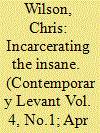| Srl | Item |
| 1 |
ID:
165585


|
|
|
|
|
| Summary/Abstract |
Although much has been written about counterinsurgency, policing, and incarceration under the British mandate in Palestine, little work has been done on those who entered the ambit of the carceral system as ‘criminal lunatics’. Criminal lunatics – the term used at the time to specifically designate those found ‘guilty but insane’ by the mandate’s criminal courts, and retained throughout this article both for the sake of analytic clarity and to avoid misdiagnosing individuals by the retrospective imposition of contemporary medical terms – confounded the mandatory government by potentially falling under the responsibility of both its criminal-legal and medical wings. While the focus in the wider scholarship on psychiatry has often been on its expansionist appetites, the struggle over responsibility for criminal lunatics in mandate Palestine offers a case study in the reverse; an attempt to abdicate, not aggrandise, as the health department staved off repeated efforts to make them take responsibility for these cases. This article traces these disputes, and the development of a distinct institutional landscape attendant on their outcome. But the fate of criminal lunatics was not merely determined by debates internal to government; families were important interlocutors too, who variously sought the release of their incarcerated mentally ill relatives, or – more worryingly for the mandate – exploited the criminal-legal system as a back-door to the overcrowded and underfunded government mental institutions. Far from seeing psychiatry as a tool of social control, the government expressed concern about the potential misuse of psychiatric ideas, processes, and institutions by Palestinian families as a way to escape obligations to mentally ill relatives. Foregrounding these fraught contestations brings into focus the sharp limits of the mandate’s ambitions in the sphere of the intimate, and the attempts of some Palestinians to expand those limits for their own ends.
|
|
|
|
|
|
|
|
|
|
|
|
|
|
|
|
| 2 |
ID:
183180


|
|
|
|
|
| Summary/Abstract |
Colonialism in the nineteenth century brought a new ‘space’ for lunatics in British India. The Northeastern province witnessed the establishment of a lunatic asylum in 1876 at Tezpur in present-day Assam. The article explores the historical development of mental health services by the British in this particular region and constructs a history of colonial control of the natives through employing a strict system under the lunatic asylum service. The methods of confinement of inmates, mainly from poor sections of society, and treatment patterns that focussed more on profits and disciplining of inmates, suggest that the asylum was more custodial rather than curative.
|
|
|
|
|
|
|
|
|
|
|
|
|
|
|
|